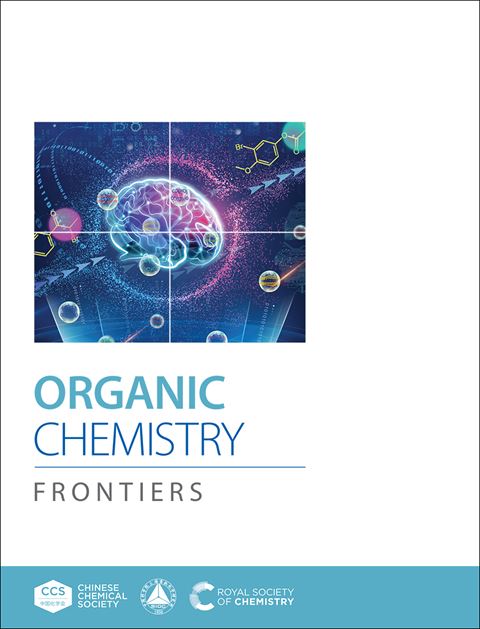Regioselective Formation of Naphtho[2,1-b]selenophenes via Cascade Cyclization of 1,3-Diynylpropargyl Alcohols Promoted by Iron(III) Chloride and Diorganyl Diselenides
IF 4.7
1区 化学
Q1 CHEMISTRY, ORGANIC
引用次数: 0
Abstract
This manuscript reports a selective diorganyl diselenide/iron(III)-promoted strategy for the synthesis of selenium-containing heterocycles, specifically naphtho[2,1-b]selenophene derivatives, via cascade cyclization reactions.Using 1,3diynylpropargyl alcohols as key substrates and diorganyl diselenides as selenium sources, the optimized conditions involve iron(III) chloride and dibutyl diselenide in dichloromethane under an inert atmosphere at room temperature, followed by the addition of the substrate and stirring for 12 hours. A series of 25 novel derivatives was synthesized in good yields, demonstrating the scope and versatility of the protocol, which was also extended to include diorganyl disulfides. However, the optimized conditions did not work for diorganyl ditellurides, even when some reaction parameters were changed. The reaction mechanism insights are discussed, and the synthetic utility of the resulting heterocycles as intermediates in further transformations is showcased. This cascade process enables the formation of four new bonds (carbon-carbon, carbonselenium, selenium-carbon, and carbon-selenium) in a single reaction step.氯化铁(III)和二有机二烯醚促进1,3-二炔丙基醇级联环化形成萘[2,1-b]硒烯的区域选择性
本文报道了一种选择性二有机基二硒化物/铁(III)促进策略,通过级联环化反应合成含硒杂环,特别是萘[2,1-b]硒烯衍生物。以1,3二炔丙基醇为主要底物,二有机基二硒化物为硒源,在室温惰性气氛下,二氯甲烷中加入氯化铁(III)和二丁基二硒化物,加入底物,搅拌12小时。一系列的25个新的衍生物以良好的产量合成,证明了该协议的范围和通用性,也扩展到包括二硫二有机基。然而,即使改变一些反应参数,优化的条件也不适用于二有机二碲化物。讨论了反应机理的见解,并展示了所得到的杂环化合物在进一步转化中的合成用途。这种级联过程可以在一个反应步骤中形成四种新键(碳-碳、碳-硒、硒-碳和碳-硒)。
本文章由计算机程序翻译,如有差异,请以英文原文为准。
求助全文
约1分钟内获得全文
求助全文
来源期刊

Organic Chemistry Frontiers
CHEMISTRY, ORGANIC-
CiteScore
7.90
自引率
11.10%
发文量
686
审稿时长
1 months
期刊介绍:
Organic Chemistry Frontiers is an esteemed journal that publishes high-quality research across the field of organic chemistry. It places a significant emphasis on studies that contribute substantially to the field by introducing new or significantly improved protocols and methodologies. The journal covers a wide array of topics which include, but are not limited to, organic synthesis, the development of synthetic methodologies, catalysis, natural products, functional organic materials, supramolecular and macromolecular chemistry, as well as physical and computational organic chemistry.
 求助内容:
求助内容: 应助结果提醒方式:
应助结果提醒方式:


